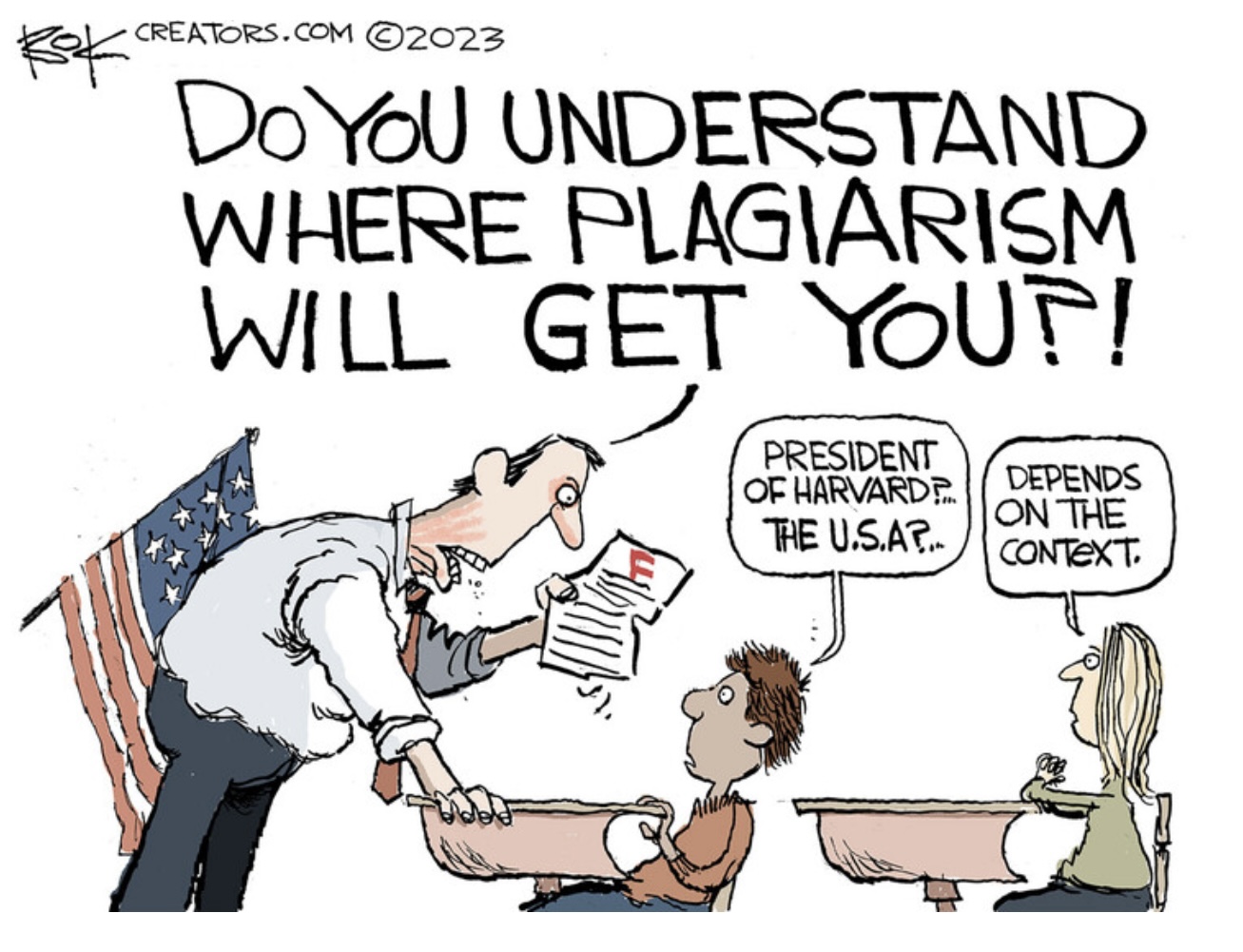Use your eyes and plagiarize. (That is a joke)
Plagiarism is always wrong, but it is not necessarily deliberate.

By definition, plagiarism is using or closely imitating the language of another without authorization, and representing the work as one’s own by not crediting the author.
It is a very serious ethics breach in journalism, and in other forms of literature.
But not just in journalism and literature. Before Joe Biden was president, he appropriated the background of British politician Neil Kinnock as his own during his 1988 Presidential campaign. A year earlier, he confessed to plagiarizing while in law school, but said it was not “malevolent.”
Other famous plagiarizers range from Dr. Martin Luther King to Jane Goodall to Johnny Cash.
And many, many more.
Including former Harvard President Claudine Gay, who clearly stole work from others and presented it as her own. That is theft, pure and simple.
That seems very deliberate.
To me, less clear was the case against columnist and TV pundit Fareed Zakaria, and Pulitzer Prize-winning Doris Kearns Goodwin. In the latter case, she borrowed passages from someone else’s work without credit in her book, “The Fitzgeralds and the Kennedys.” About the same time, another historian, Stephen E. Ambrose confessed he failed to acknowledge the work of others in his book, “The Wild Blue.”
How can that happen?
Well, it could be the work of research assistants taking short cuts, or laziness or ego on the part of the author, who is responsible for the work of assistants. If deliberate, it is shameful because it is so easy to avoid. A thorough rewrite of someone else’s work will usually keep you out of trouble. As an example, I condensed the work of others in summarizing the examples of plagiarism, but I did not plagiarize.
With Zakaria, generally speaking, he often did credit another writer, but not often enough. When using someone else’s work, you should credit in each paragraph.
Yes, it may “slow” the narrative, as some alibi, but it keeps you out of trouble.
Back in the ‘80s, when I was a TV critic, a colleague — a gifted writer — at a New Orleans newspaper, in writing a review of a show, lifted 500 words of running text from a novel. That’s about 14 inches of text. Too bad for him, one of his readers knew the novel, called the paper and reported him.
His boss suspended him for a week, without pay, as I recall, and gave him a stern warning.
Lesson learned?
Nope, he did it again. He should have been fired, but the paper turned him into a police reporter. Why? Punishment? I don’t know. The most puzzling thing, as I said, is that he was a gifted writer. His work stood on its own two legs, but he felt the need for special sauce, I guess.
Right here in Philadelphia, the Daily News’ Larry Fields, who owned the city’s most popular column before I inherited it, got caught with his hand in the cookie jar.
This was decades before the internet. Fields subscribed to Variety, the show-biz paper, plus some out-of-town newspapers, including the San Francisco Chronicle, which employed the legendary Herb Caen.
In newspapers, it is customary for gossip columnists and other writers to rewrite each other. It is also customary to give credit, but that custom is not always observed. Nowadays, there are computer programs that search the internet for identical language in another document. It is easy to catch cheats, if you try. Harvard did not try, for whatever reason.
On one occasion, Field wrote an item — I am doing this from memory — about how trash collectors awakened people in his Society Hill neighborhood about 4 in the morning, leading to calls to police, who arrived to calm neighbors..
A nice little slice of life in the big city.
Too bad for Fields, a Philadelphian returning from a trip to San Francisco read the exact same item written by Herb Caen and published in the Chronicle a few days earlier. Except the neighborhood was in San Francisco.
The reader called the editor if the Daily News, who cut Fields a new butthole.
But did not fire him, because, really, Fields had too many readers. Right or wrong that’s sometimes how things work in real life. When Fields died and I was given the column, I was “advised’ to stick to facts.
It was a warning I did not need, and the first thing I did was declare the column would be local, and only local. Subscriptions to out-of-town newspapers were canceled.
I do not mean to set myself up as a paragon of journalistic virtue. Believe it or not, the cheats in journalism are the exception to the rule.



